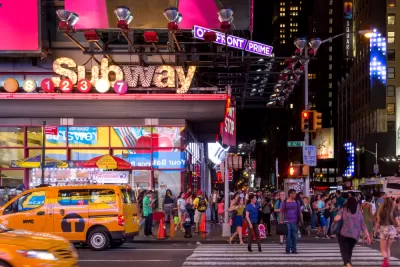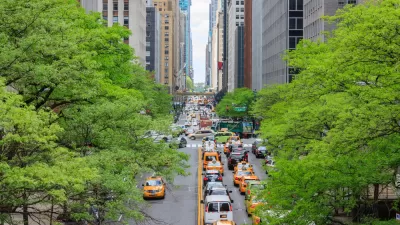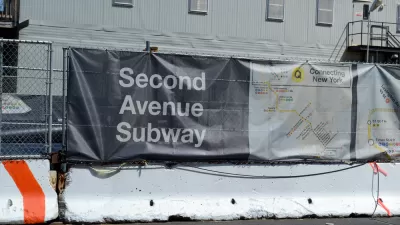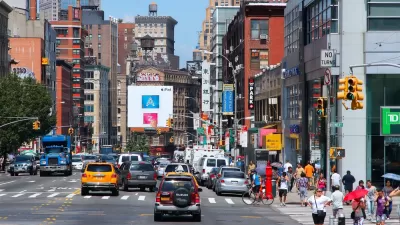In an opinion for City & State, Kathryn Wylde, president of the nonprofit Partnership for New York City, makes the case that the Metropolitan Transportation Authority should be allowed to tax properties where value is enhanced by subway proximity.

As POLITICO New York reported March 21, Gov. Andrew Cuomo is drafting legislation that "would demarcate huge swaths of Manhattan and the Bronx as 'transportation improvement districts,' and allow the state-run Metropolitan Transportation Authority to take property tax revenue from those districts that it claims is generated by transit improvements as far as a mile away" for the purpose of rehabilitating the 665-mile subway system which has fallen into deep disrepair.
Planetizen noted much opposition to the proposal. Deputy Mayor Dean Fuleihan claimed it would wrest "billions" from New York City. The governor's proposal would "usurp the city’s control over its own tax dollars," opined Carol Kellermann, president of the Citizens Budget Commission, for City & State on March 21, as did a New York Post op-ed on March 18.
Kathryn S. Wylde, president and CEO of Partnership for New York City, offers a different perspective on March 22 for City & State.
The rivalry between New York City and state governments has confused the issue and made it seem to some as if this is a cynical money grab, rather than a praiseworthy entrepreneurial initiative by the MTA.
A failure to move this forward would put important projects like New York Penn Station redevelopment, the completion of the Second Avenue subway and new Metro-North stations in the Bronx in jeopardy, since the MTA does not currently have the money for them.
Wylde acknowledges the opposition but believes both sides can work together.
Value capture, as set forward in the executive budget, was interpreted by the city government, the Real Estate Board of New York and others as a money grab for tax revenues that rightfully belong to the city or an unfair supertax on real estate developers who are also contributing to area improvements.
That is easy to fix, and a process that ensures the city is at the table and able to negotiate mutually beneficial terms with the MTA is currently under discussion.
In the end, the case for repairing the subway should motivate city leaders and the Cuomo administration to reach an understanding to use value capture to fund essential public transit improvements, which is in everyone's best interests, she concludes.
FULL STORY: Opinion:MTA’s value capture proposal needs to pass

Study: Maui’s Plan to Convert Vacation Rentals to Long-Term Housing Could Cause Nearly $1 Billion Economic Loss
The plan would reduce visitor accommodation by 25,% resulting in 1,900 jobs lost.

North Texas Transit Leaders Tout Benefits of TOD for Growing Region
At a summit focused on transit-oriented development, policymakers discussed how North Texas’ expanded light rail system can serve as a tool for economic growth.

Using Old Oil and Gas Wells for Green Energy Storage
Penn State researchers have found that repurposing abandoned oil and gas wells for geothermal-assisted compressed-air energy storage can boost efficiency, reduce environmental risks, and support clean energy and job transitions.

Private Donations Propel Early Restoration of Palisades Playground
Los Angeles has secured over $1.3 million in private funding to restore the Pacific Palisades playground months ahead of schedule, creating a modern, accessible space that supports community healing after recent wildfires.

From Blight to Benefit: Early Results From California’s Equitable Cleanup Program
The Equitable Community Revitalization Grant (ECRG) program is reshaping brownfield redevelopment by prioritizing projects in low-income and environmental justice communities, emphasizing equity, transparency, and community benefits.

Planting Relief: Tackling Las Vegas Heat One Tree at a Time
Nevada Plants, a Las Vegas-based nonprofit, is combating the city’s extreme urban heat by giving away trees to residents in underserved neighborhoods, promoting shade, sustainability, and community health.
Urban Design for Planners 1: Software Tools
This six-course series explores essential urban design concepts using open source software and equips planners with the tools they need to participate fully in the urban design process.
Planning for Universal Design
Learn the tools for implementing Universal Design in planning regulations.
Ascent Environmental
Borough of Carlisle
Institute for Housing and Urban Development Studies (IHS)
City of Grandview
Harvard GSD Executive Education
Toledo-Lucas County Plan Commissions
Salt Lake City
NYU Wagner Graduate School of Public Service





























